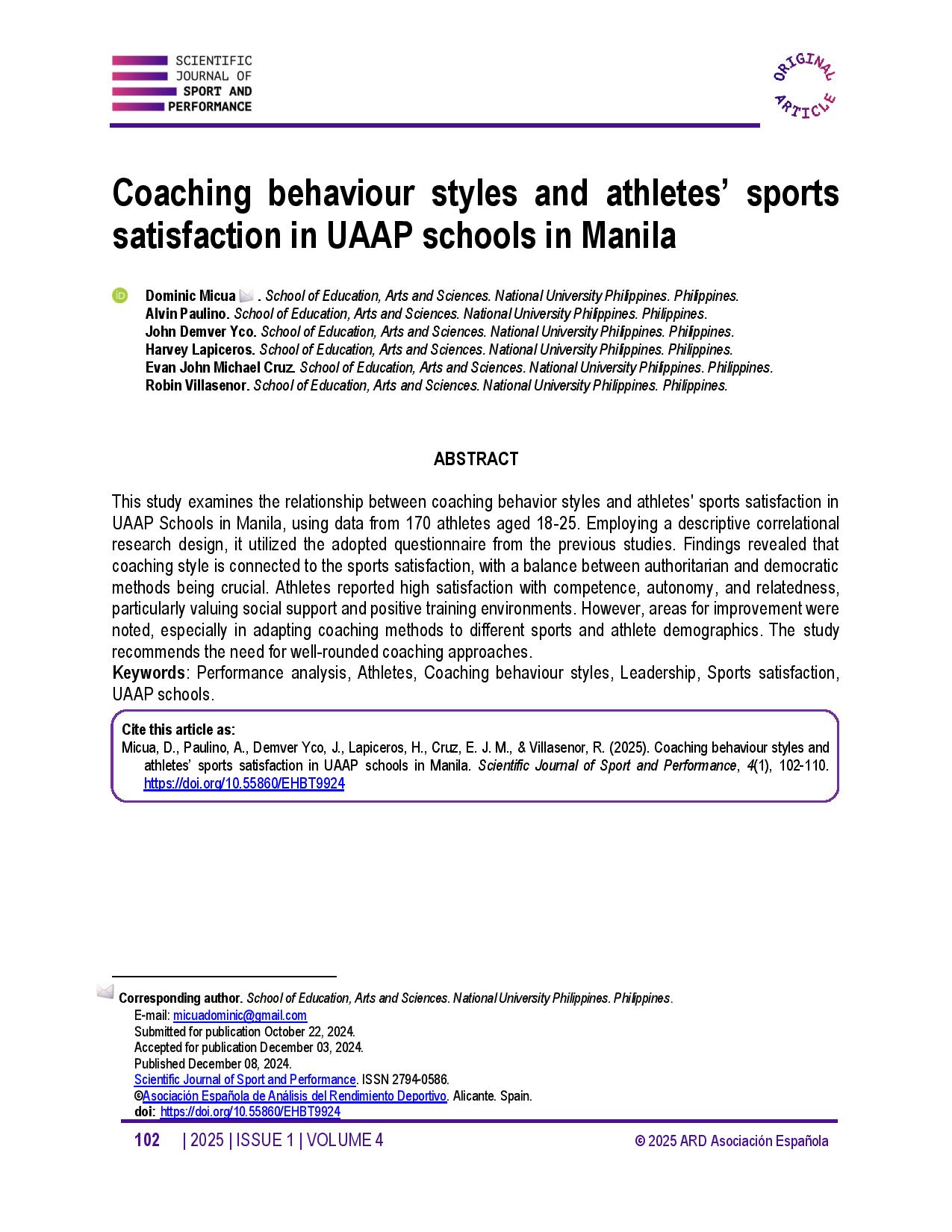Coaching behaviour styles and athletes’ sports satisfaction in UAAP schools in Manila
Main Article Content
Abstract
This study examines the relationship between coaching behavior styles and athletes' sports satisfaction in UAAP Schools in Manila, using data from 170 athletes aged 18-25. Employing a descriptive correlational research design, it utilized the adopted questionnaire from the previous studies. Findings revealed that coaching style is connected to the sports satisfaction, with a balance between authoritarian and democratic methods being crucial. Athletes reported high satisfaction with competence, autonomy, and relatedness, particularly valuing social support and positive training environments. However, areas for improvement were noted, especially in adapting coaching methods to different sports and athlete demographics. The study recommends the need for well-rounded coaching approaches.
Article Details

This work is licensed under a Creative Commons Attribution-NonCommercial-ShareAlike 4.0 International License.
References
Ampofo‐Boateng, K. (2009). Satisfaction with recreational sports facilities and services in Malaysia: Demographic influences. Annals of Leisure Research, 12, 22-46. https://doi.org/10.1080/11745398.2009.9686807 DOI: https://doi.org/10.1080/11745398.2009.9686807
Bakri, N. H. S., Mashuri, S. N., Mokhtar, U. K. M., & Rahman, M. W. A. (2022). Relationship between coach leadership styles and athletes' satisfaction at UITM Seremban. International Journal of Academic Research in Business and Social Sciences, 12(7), 1237-1245. https://doi.org/10.6007/IJARBSS/v12-i7/13905 DOI: https://doi.org/10.6007/IJARBSS/v12-i7/13905
Bartholomew, K. J., Ntoumanis, N., & Thøgersen‐Ntoumani, C. (2009). A review of controlling motivational strategies from a self-determination theory perspective: Implications for sports coaches. International Review of Sport and Exercise Psychology, 2, 215-233. https://doi.org/10.1080/17509840903235330 DOI: https://doi.org/10.1080/17509840903235330
Bebetsos, E., Filippou, F., & Bebetsos, G. (2017). Athletes' criticism of coaching behavior: Differences among gender and type of sport. Polish Psychological Bulletin, 48, 66-71. https://doi.org/10.1515/ppb-2017-0008 DOI: https://doi.org/10.1515/ppb-2017-0008
Bracher, J. (2016, September 10). UAAP: Ex-Bulldog Alolino has faith in Alejandro's leadership. RAPPLER. Retrieved from [Accessed 2024, 04 December]: https://www.rappler.com/sports/uaap/145815-uaap-nu-gelo-alolino-faith-jay-alejandro-leadership/
Breuer, C., Hallmann, K., Wicker, P., & Feiler, S. (2010). Socio-economic patterns of sport demand and ageing. European Review of Aging and Physical Activity, 7, 61-70. https://doi.org/10.1007/s11556-010-0066-5 DOI: https://doi.org/10.1007/s11556-010-0066-5
Chelladurai, P., & Saleh, S. D. (1980). Dimensions of leader behavior in sports: Development of a leadership scale. Journal of Sport Psychology, 2, 34-45. https://doi.org/10.1123/jsp.2.1.34 DOI: https://doi.org/10.1123/jsp.2.1.34
Cruz, A. B., & Kim, H. (2017). Leadership preferences of adolescent players in sport: Influence of coach gender. Journal of Sports Science & Medicine, 16(2), 172-179.
Huff, C.-M. (2019). Coaching styles, athletes' needs satisfaction, and identity: An analysis of athlete-coach relationships (Publication No. 175) [Doctoral dissertation, Abilene Christian University]. Digital Commons @ ACU. Retrieved from [Accessed 2024, 04 December]: https://digitalcommons.acu.edu/etd/175
Ignacio, R. A., Montecalbo-Ignacio, R. C., & Cardenas, R. C. (2017). The relationship between perceived coach leadership behaviors and athletes' satisfaction. International Journal of Sports Science, 7, 196-202.
Komenda, S., Springstein, T., Zrnić, I., Zeilinger, E. L., Franken, F., & Weber, G. (2021). Satisfaction with life in Special Olympic athletes: The role of autonomy support and basic need fulfilment. International Journal of Developmental Disabilities, 68, 964-972. https://doi.org/10.1080/20473869.2021.1917110 DOI: https://doi.org/10.1080/20473869.2021.1917110
Kwon, H., Pyun, D. Y., & Kim, M. (2010). Perceived leadership behavior of physical education teacher-coaches: When they teach vs. when they coach. Journal of Teaching in Physical Education, 29, 131-145. https://doi.org/10.1123/jtpe.29.2.131 DOI: https://doi.org/10.1123/jtpe.29.2.131
Moen, F., & Federici, R. A. (2013). Coaches' coaching competence in relation to athletes' perceived progress in elite sport. Journal of Education and Learning, 2, 240-252. https://doi.org/10.5539/jel.v2n1p240 DOI: https://doi.org/10.5539/jel.v2n1p240
Naredo, C. (2022, September 29). Michael Phillips eyes increased leadership role in La Salle. ABS-CBN News. Retrieved from [Accessed 2024, 04 December]: https://news.abs-cbn.com/sports/09/29/22/michael-phillips-eyes-increased-leadership-role-in-la-salle
Narwal, R. (2014). Effect of coaching behavior in sports. Semantic Scholar.
Norris, L. A., Didymus, F. F., & Kaiseler, M. (2020). Understanding social networks and social support resources with sports coaches. Psychology of Sport and Exercise, 48, 101665. https://doi.org/10.1016/j.psychsport.2020.101665 DOI: https://doi.org/10.1016/j.psychsport.2020.101665
Partington, M., Cushion, C. J., & Harvey, S. (2014). An investigation of the effect of athletes' age on the coaching behaviours of professional top-level youth soccer coaches. Journal of Sports Sciences, 32, 403-414. https://doi.org/10.1080/02640414.2013.835063 DOI: https://doi.org/10.1080/02640414.2013.835063
Podlog, L., Lochbaum, M., & Stevens, T. (2010). Need satisfaction, well-being, and perceived return-to-sport outcomes among injured athletes. Journal of Applied Sport Psychology, 22, 167-182. https://doi.org/10.1080/10413201003664665 DOI: https://doi.org/10.1080/10413201003664665
Robert Wood. (2010, May). The role of the coach in sports. Topend Sports Website. Retrieved from [Accessed 2024, 04 December]: https://www.topendsports.com/coaching/role.htm
Smith, M. B., & Cushion, C. J. (2006). An investigation of the in-game behaviours of professional, top-level youth soccer coaches. Journal of Sports Sciences, 24, 355-366. https://doi.org/10.1080/02640410500131944 DOI: https://doi.org/10.1080/02640410500131944
The Rivalry. (2023, September 27). UAAP unveils Commissioner's team for Season 86. Rivalry Network.
Trninić, M., Trninić, S., & Papić, V. (2009). Development management model of elite athletes in team sports games. Coll. Antropol, 33(2), 363-372.




